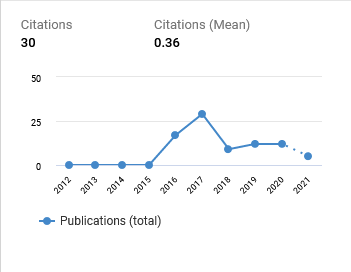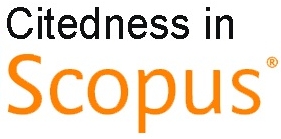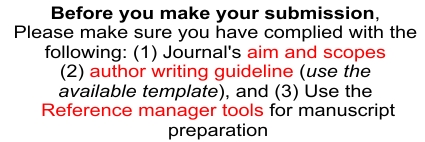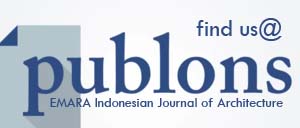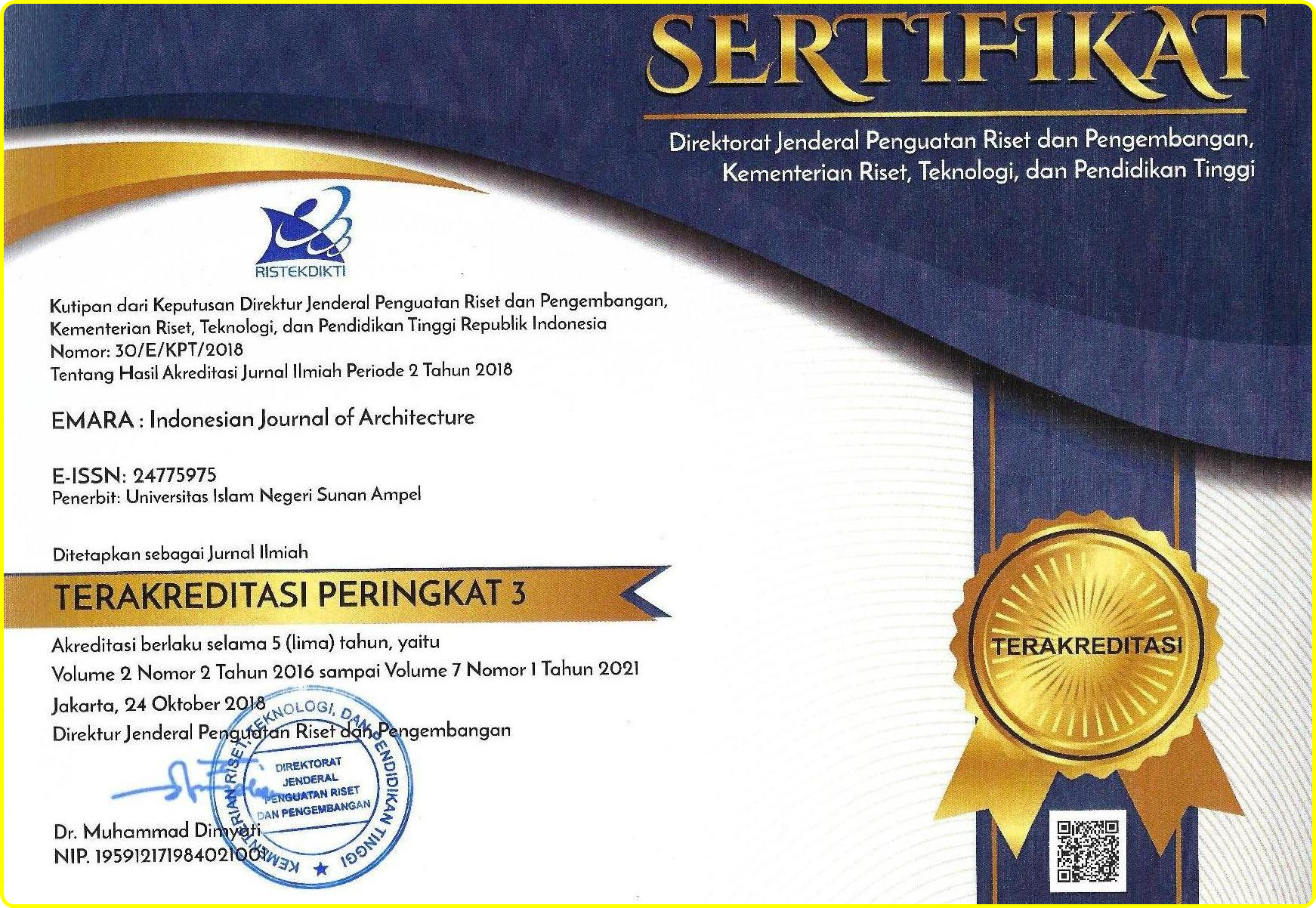Keberlanjutan Kampung Lama Berbasis Potensi Kearifan Lokal di Kota Semarang
DOI:
https://doi.org/10.29080/emara.v3i2.154Keywords:
old kampung, local wisdom, kampung sustainabilityAbstract
The old kampung is an embryo of urban development which has historical and cultural values, as well as the identity. However, the old kampung is threatened physically and noThe old kampung was an embryo for urban development which has historical and cultural values, as well as the identity. However, the old kampung was threatened physically and non-physically due to urban development. The article aimed to showed the strategies to achieve kampung sustainability through the potential of local wisdom. A qualitative research method conducted with qualitative descriptive analysis technique by taking Kampung Bustaman, Semarang as the study location. The analysis showed that Kampung Bustaman has local wisdom in the form of economic activities that has been manifested in the community daily lifes and potentially became the major capital to achieve kampung sustainability. The strategies involved the stakeholder roles, such as local communities, government and other parties through the kampung events. The tourism was able to encouraged communities participation and strengthen the economic as well as the social life of local communities. Local communities participation and local organizations commitment to preserving local wisdom also play an important role for achieving the kampung sustainability.nphysically due to urban development. The article aims to show the strategy to achieve kampung sustainability through the potential of local wisdom. The study was conducted by using qualitative research method with qualitative descriptive analysis technique by taking the study area in Kampung Bustaman, Semarang City. The analysis shows that Kampung Bustaman has local wisdom in the form of economic activity that has been manifested in the daily life of the community and potentially as the capital to achieve kampung sustainability. The strategy to achieve kampung sustainability involves the role of stakeholders, such as local communities, government and other parties through the kampung events. The tourism is able to encourage the communities participation and strengthen the economic and social life of local community. Local community participation and local organizations' commitment to preserving local wisdom also play an important role in achieving kampung sustainability.
Downloads
References
Azahro, M., & Yuliastuti, N. (2013). Kajian kehidupan masyarakat kampung lama sebagai potensi keberlanjutan lingkungan permukiman Kelurahan Gabahan Semarang. Teknik PWK, 2(3), 481–490.
Chaidir, A., & Murtini, T. W. (2014). Keberlanjutan Permukiman Rawa Desa Baru di Kabupaten Hulu Sungai Utara Kalimantan Selatan. Jurnal Pembangunan Wilayah Dan Kota, 10(1), 59–69.
Dahliani, D. (2015). Local wisdom in built environment in globalization era. International Journal of Education and Research, 3(6), 157–166.
Dewi, D. P., & Syahbana, J. A. (2015). Kebertahanan Kawasan Perkampungan Pedamaran Semarang. Jurnal Teknik PWK, 4(1), 93–106.
Dyah, V., & Yuliastuti, N. (2014). Penilaian Keberlanjutan Permukiman Kampung Lama di Kelurahan Lempongsari. Jurnal Teknik PWK, 3(4), 766–775.
Ernawati, R., Santosa, H. R., & Setijanti, P. (2013). Facing urban vulnerability through kampung development, case study of kampungs in Surabaya, Indonesia. Humanities and Social Sciences, 1(1), 1–6. http://doi.org/10.11648/j.hss.20130101.11.
Ernawati, R., Santosa, H. R., & Setijanti, P. (2014). Community Initiatives in Developing Sustainable Settlements, Case Study Kampung in Surabaya Indonesia. International Journal of Engineering Research & Technology, 3(6), 2242–2245.
Hendro, E. P. (2015). Pelestarian Kawasan Konservasi di Kota Semarang. Jurnal Konservasi Cagar Budaya Borobudur, 9(1), 17–28.
Jones, A. (1997). Urban conservation issues in Brunei Darussalam: the case of Brunei’s water villages. Planning Perspectives, 12(4), 457–475. http://doi.org/10.1080/026654397364627.
Juwono, S. (2005). Keberadaan Kampung Kota di Kawasan Segitiga Emas Kuningan Kontribusi pada Rancang Kota. In Seminar Nasional PESAT 2005. Jakarta: Universitas Gunadarma.
Madiasworo, T. (2009). Revitalisasi Nilai-Nilai Kearifan Lokal Kampung Melayu Semarang. Local Wisdom, I(1), 10–18.
Manafe, J. D., Setyorini, T., & Alang, Y. A. (2016). Pemasaran Pariwisata Melalui Strategi Promosi Objek Wisata Alam, Seni dan Budaya (Studi Kasus di Pulau Rote NTT). Jurnal Bisnis Dan Manajemen Islam, 4(1), 101–123.
Mani, M., Varghese, K., & Ganesh, L. S. (2005). Integrated Model Framework to Simulate Sustainability of Human Settlements. Journal of Urban Planning and Development, 131(3), 147–158. http://doi.org/10.1061/(ASCE)0733-9488(2005)131:3(147).
Nasongkhla, S., & Sintusingha, S. (2012). Social Production of Space in Johor Bahru. Urban Studies, 50(9), 1836–1853. http://doi.org/10.1177/0042098012465907.
Palapin, P. (2014). Forms of Promotion and Dissemination of Traditional Local Wisdom: Creating Occupations among the Elderly in Noanmueng Community , Muang Sub-District , Baan. International Journal of Social, Behavioral, Educational, Economic, Business and Industrial Engineering, 8(8), 2715–2718.
Pawitro, U. (2012). Masyarakat Kampung Kota-Kondisi Permukimannya dan Upaya Perbaikan Lingkungan Kampung Kota (Studi Kasus RW-12 Kel. Babakan Surabaya Kec.Kiaracondong Kota Bandung). In Seminar Regional Pembangunan Jawa Barat 2012. Jatinangor, Bandung: LPPM Universitas Padjajaran.
Puspitasari, P., Djunaedi, A., Sudaryono, & Putra, H. S. A. (2012). Cyclical Changes of Space: The phenomena of Space Changes in Historic-Religious Kampung Luar Batang, Jakarta, Indonesia. Asian Journal of Environment-Behaviour Studies, 3(9), 33–46.
Putra, B. A. (2013). The Survival Phenomenon of Kampong Kuningan Amidst the Development of Mega Kuningan Business-area in Jakarta Indonesia. International Journal of Scientific & Engineering Research, 4(1), 1–6.
Ridwan, N. A. (2007). Landasan Keilmuan Kearifan Lokal. Ibda`, 5(1), 1–8.
Sartini, S. (2004). Menggali kearifan lokal nusantara sebuah kajian filsafati. Jurnal Filsafat, 37(2), 111–120.
Setiawan, B. (2010). Kampung Kota dan Kota Kampung: Tantangan Perencanaan Kota di Indonesia. Pidato Pengukuhan Jabatan Guru Besar Dalam Ilmu Perencanaan Kota Universitas Gadjah Mada. Yogyakarta, Indonesia.
Subagyo. (2014). Tiga Kampung Kini Tinggal Kenangan. Retrieved March 17, 2015, from http://www.koranwawasan.com/02/05/2014/tiga-kampung-kini-tinggal-kenangan/.
Suliyati, T. (2012). Dinamika Kawasan Permukiman Etnis di Semarang, 1–16. Retrieved from http://eprints.undip.ac.id/34046/.
Vitasurya, V. R. (2016). Local Wisdom for Sustainable Development of Rural Tourism, Case on Kalibiru and Lopati Village, Province of Daerah Istimewa Yogyakarta. Procedia - Social and Behavioral Sciences, 216(October 2015), 97–108. http://doi.org/10.1016/j.sbspro.2015.12.014.
Wijanarka. 2007. Semarang Tempo Dulu: Teori Desain Kawasan Bersejarah. Yogyakarta: Penerbit Ombak.
World Commission on Environment and Development (WCED). (1987). Our Common Future. New Delhi: Oxford University Press.

Downloads
Published
How to Cite
Issue
Section
Categories
License
Copyright (c) 2017 Annisa Mu'awanah Sukmawati

This work is licensed under a Creative Commons Attribution-ShareAlike 4.0 International License.
- Authors retain copyright and grant the journal right of first publication with the work simultaneously licensed under a Creative Commons Attribution ShareAlike License that allows others to share the work with an acknowledgment of the work's authorship and initial publication in this journal.
- Authors are able to enter into separate, additional contractual arrangements for the non-exclusive distribution of the journal's published version of the work (e.g., post it to an institutional repository or publish it in a book), with an acknowledgment of its initial publication in this journal.
- Authors are permitted and encouraged to post their work online (e.g., in institutional repositories, pre-print sites, or on their website) prior to and during the submission process, as it can lead to productive exchanges, as well as earlier and greater dissemination of published work.






